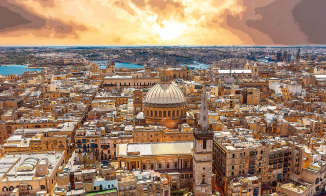According to the European Commission’s winter forecast, despite a severe economic contraction of around 9% in 2020, Malta’s economy will grow by 4.5% in 2021. A recent proposal by the Commission to end quarantine and testing for vaccinated adults travelling from one EU country to another will be welcome news for the island nation, for which tourism is one of the top five contributors to the economy. The Maltese government’s response to the Covid-19 pandemic has been robust and, at times, has been praised by the World Health Organisation. On 25 May, the minister for health Chris Fearne stated that 70% of the population had been vaccinated, making it the first country in the world to reach the estimated benchmark for herd immunity.
In June 2020, the Maltese government set out measures to alleviate the financial pressures brought on by the pandemic; these attempted to increase investment, incentivise domestic consumption and reduce the costs of operating a business. For workers, this meant the extension of the Covid-19 wage supplement with a particular focus on those who are dependent on the tourism industry for work. For businesses, a range of cost-cutting measures were introduced, including rent and electricity subsidies, refunds of trading licences, refunds on port charges and grants, among others. Employers were also offered cash to facilitate the costs of setting up workers to work remotely and a quarantine leave grant was offered for each worker who had to undertake mandatory quarantine. Also, at the start of the pandemic, €900m was provided in bank guarantees for businesses who required loans for operational matters, which was provided by the National Development and Social Fund, and a number of EU funds. Continue reading “Life in a bubble – the Malta report”









